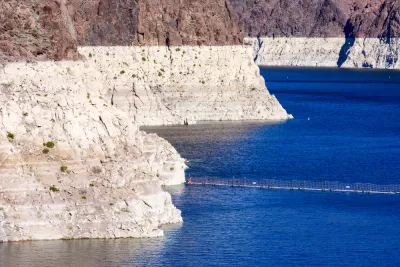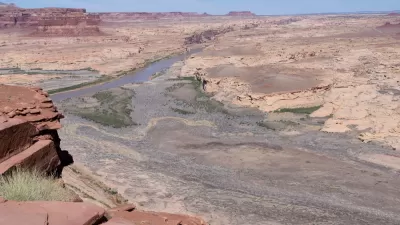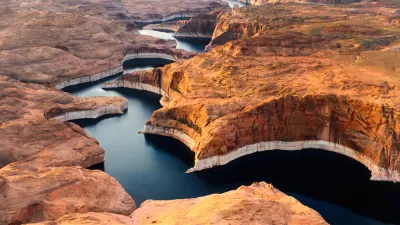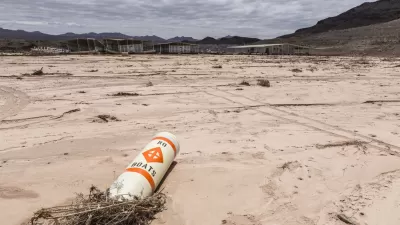The states that rely on the Colorado’s water must make drastic cuts in water usage to maintain use of the West’s most important—and most threatened—water source.

In a conversation with journalist Abrahm Lustgarten, NPR’s Dave Davies examines the worsening water crisis on the Colorado River and the difficult choices faced by residents and officials in the seven states affected. As Lustgarten explains, there is “a palpable sense of emergency when you visit those places.”
Lustgarten describes the as-yet-unsuccessful attempt by the states to come to an agreement on water conservation goals and strategies. “But in order to reach an agreement for how we share the Colorado River going forward, the states will probably need to abandon everything that they've held to in the past about how they use that water, about which industries are supported by it and how cities are grown by it,” Lustgarten asserts, going on to explain the complex nature of water rights in the American West.
According to Lustgarten, “Part of the water law that's pervasive across the West and especially in the upper basin, which includes Colorado, is a stipulation that your water rights are protected so long as you use them. And if you don't use them, then they could be jeopardized.” This has led to landowners sometimes wasting water to protect their long-term rights. Meanwhile, states have shown “an unwillingness to respond with the sense of urgency and at the scale that all of that data and science suggest is needed,” even as drastically low water levels threaten electricity production at the river’s major dams.
FULL STORY: The Colorado River water shortage is forcing tough choices in 7 states

Maui's Vacation Rental Debate Turns Ugly
Verbal attacks, misinformation campaigns and fistfights plague a high-stakes debate to convert thousands of vacation rentals into long-term housing.

Planetizen Federal Action Tracker
A weekly monitor of how Trump’s orders and actions are impacting planners and planning in America.

In Urban Planning, AI Prompting Could be the New Design Thinking
Creativity has long been key to great urban design. What if we see AI as our new creative partner?

King County Supportive Housing Program Offers Hope for Unhoused Residents
The county is taking a ‘Housing First’ approach that prioritizes getting people into housing, then offering wraparound supportive services.

Researchers Use AI to Get Clearer Picture of US Housing
Analysts are using artificial intelligence to supercharge their research by allowing them to comb through data faster. Though these AI tools can be error prone, they save time and housing researchers are optimistic about the future.

Making Shared Micromobility More Inclusive
Cities and shared mobility system operators can do more to include people with disabilities in planning and operations, per a new report.
Urban Design for Planners 1: Software Tools
This six-course series explores essential urban design concepts using open source software and equips planners with the tools they need to participate fully in the urban design process.
Planning for Universal Design
Learn the tools for implementing Universal Design in planning regulations.
Appalachian Highlands Housing Partners
Gallatin County Department of Planning & Community Development
Heyer Gruel & Associates PA
Mpact (founded as Rail~Volution)
City of Camden Redevelopment Agency
City of Astoria
City of Portland
City of Laramie





























